Watching the //BUILD stuff, I saw that WinRT API's can be consumed by C code:

I am rather excited about a fresh C API available to Win32 developers.
Where can I find information on the C WinRT API? How is it better than the existing Win32 C API?
Watching the //BUILD stuff, I saw that WinRT API's can be consumed by C code:

I am rather excited about a fresh C API available to Win32 developers.
Where can I find information on the C WinRT API? How is it better than the existing Win32 C API?
WinRT is fundamentally COM, so using WinRT components from C is like using COM components from C. Like before, you get .idl files for all WinRT components, and also .h files produced from those .idl files. The .h files include both C++ and C declarations (wrapped in #ifdef __cplusplus as needed). You can just #include them and start hacking away.
It's not exactly neat, though, e.g. something like this C++/CX:
Windows::UI::Xaml::Controls::TextBlock^ tb = ...;
tb->Text = "Foo";
which is equivalent to this vanilla C++:
Windows::UI::Xaml::Controls::ITextBlock* tb = ...;
HSTRING hs;
HRESULT hr = WindowsStringCreate(L"Foo", 3, &hs);
// check hr for errors
hr = tb->set_Text(hs);
// check hr for errors
tb->Release();
would be written in C as:
__x_Windows_CUI_CXaml_CControls_CITextBlock* tb = ...;
HRESULT hr;
HSTRING hs;
hr = WindowsCreateString(L"Foo", 3, &hs);
// check hr for errors
hr = __x_Windows_CUI_CXaml_CControls_CITextBlock_put_Text(tb, hs);
// check hr for errors
IUnknown_Release(tb);
Look inside "C:\Program Files (x86)\Windows Kits\8.0\Include\winrt" in Developer Preview to see the .idl and .h files.